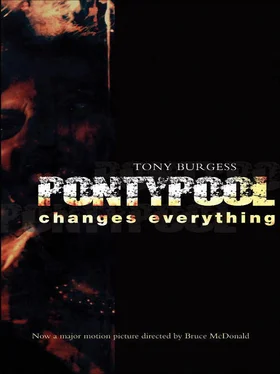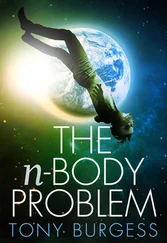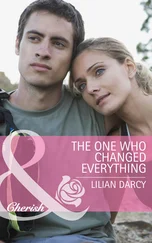“Good Lord! You’re having a trauma! What’s your name darling? You poor thing. Have you eaten? You’re lucky I came by. I have something for you. Here, have some tea. It’s calming. Chamomile.”
The man reaches in the back seat and lifts up a bright blue plastic bag. He pulls out a thermos and a folded black cloth. He lays the cloth across Ellen’s knees and pours her a cup in a yellow plastic lid. Ellen feels the steam warm her face and she lifts the cup, against the backdrop of Steve’s guiding hand, to her mouth. Heat, warmth. Steve is the little girl, and I am the monster. The tiny radiance in her mouth loosens an easy word: “Thanks.”
“There you go! You can talk. But no more. I’m taking you to a doctor. You have blood on you! Oh my God! Don’t say anything. Save your strength. You just sit back. I’m taking you to a doctor.”
Steve knows instantly what his role is, and he accepts it, creates it, with sensible limitations. He will take this woman to safety and from there apologize on his cell phone to his business partners for being sidetracked. With the silent woman beside him, looking out the passenger window, Steve does a mental inventory of the contents of his knapsack. Tommy Hilfiger aftershave. Vitamin B complex … If I was her, that and some echinacea. Condoms. Address book. Band-Aids. A Swiss army knife. He wants to suggest the echinacea and he turns to her. Profound. Too late or too soon for the holistic approach.
Steve believes that most people have labelled the important things frivolous and he knows that they suffer for it. Ellen has suffered for it. Steve decides that she needs some serious comforting, but seeing as they are strangers he can’t really reach across to her.
“We’ll be at Dr. Mendez’s soon, he’ll help you.”
Ellen doesn’t respond. Steve makes a concentrating face for a few seconds. Then, in frail voice and perfect key, he sings a song. The song is such a pretty replica of the original that it causes Ellen to look over to check that his lips are moving. He’s a bit loony, isn’t he?
“Her name was Rio, and she dances on the sand. Just like that river twisting through the dusty land.”
A stupid song. A stupid, stupid song. Ellen feels the sweep of a fish-eye lens bending the side of a sailboat. Tight, colourful shorts and leaping young men with bleached hair and tanned thighs. The boat surges up — breathtaking — and it cuts across a breaking wave. Ellen sings softly, not intruding on Steve’s note-perfect voice.
“And when she shines she really shows you all she can. Oh Rio, Rio, Rio — cross the Rio Grande.”
The song moves through her without seams or connection, and like a gentle learning curve it explains nothing while giving her the joyful experience of riding it. Steve smiles, encouraging her to sing. He closes his mouth to supply only a prompting hum. Ellen remembers that at one time the whole world seemed to love Duran Duran. And now, now, no one does. Steve drops the windows an inch, letting a warm wind pull at Ellen’s hair. Ellen turns her face and mouths the song; its lyrics are lost again in the new spring air. Cow shit. Wet trees. The first lungful of the new season is a rainbow of young gasses that thoroughly clean the world that has survived. A valley dips below the surface of the road, dragging trees down. The forest then flies back up, banking high above the car. Ellen gasps and touches her mouth. Four large white mailboxes skip by the window. Tiny red flags. Ellen has gone silent and thoughtful. For the rest of the trip Steve will continue singing snatches of songs. Girls On Film. This Is Planet Earth. Reflex. View To A Kill.
In the waiting room of Dr. Mendez are crammed a thousand people. This place has a capacity of maybe seventy, so over nine hundred of these people are dead, crushed beyond recognition. Their internal organs have been pushed out and across a firm terrain of shoulders. For a full hour a popcorn flurry of brains, squeezed through the open lids atop hundreds of heads, have jiggled and danced against each other in the free air above the dead. Blood has found a way to the floor and it moves around ankles. The bodies are under a pressure that binds most in the upper torso, gently curving them in an arched structure across the room. It is under the centre, where legs have been lifted, that the survivors huddle. Their chins push above the blood’s surface and the tops of their heads drive up into the soles of stiff feet, trying to bend them at the ankle. They gasp desperately in these tiny pockets of red air.
Dr. Mendez is seated at his desk, across which is stretched a body. He has decided to perform an unscheduled autopsy. So many strange deaths. Nothing to lose. Maybe a quick answer will show itself.
All of the body cavities have been opened and then hastily folded shut. Mendez lifts a corner of cheek back into position with his pen. The structure of the room behind him groans, the studs are returning to ninety-degree relationships. The waiting room is emptying.
All over the floor I imagine.
Dr. Mendez is right. As the crammed bodies redistribute their contents, under pressure, to fill the upper and lower parts of the space, the waiting room is returning to its shape. The living few are drowning and will not survive.
An epidemic of broken necks.
As he says this to himself Mendez knows that in two million years another species will unearth the skeletons of human beings. And then they will begin a great pastime. What broke all their necks? Did they build their ceilings too low? Did kick-boxing aliens once visit this planet? Did a meteor fall from the sky and whip around the globe at shoulder height? Mendez stands and approaches his file cabinet. He thinks: Well this is when the good physician should off himself, overwhelmed and thrust suddenly into such a medieval role. But no, instead he counts the bodies on his floor — six. The best is probably yet to come.

Down the road from the doctor’s office Ellen and Steve sit silently in the car. Steve is shaking his head. He wonders what all these cars are doing here. Ellen knows. She can hear the movement of zombies in the woods. The hunting stealth of exact steps carrying rabid people in the dark, just inside the bushes. Coiling their necks like cobras. Painful, empty minds. Their hundreds of round, open mouths hanging like bats from slick, wet branches.
Ellen knocks her door open and runs up the centre of the road, back beyond the cars, and turns quickly to leap blind into a wall of soft cedar. Steve remains in the car. He is so afraid that he can’t even move. The zombies are indiscriminate, and even though Steve has been sweet beyond compare, they will snatch him from behind the wheel and fight among themselves for the chance to snap his neck.
At that moment the angel who has been patiently rocking the ghost of the shallow and inconsolable Detective Peterson will look up with interest.
Ellen hides just inside the trees. Huddled, she stays still and silent. Just a few feet from where she sits a continuous line of zombies make their way down a path that runs parallel to, but hidden from, the road. She closes her eyes and feels herself drop inside and then plunge like a loose elevator. She has no time to imagine where she’s going. The core of her experience is free falling and the only visible sign of this is in the tightening of her lips. When she comes to rest she looks up the hundreds of feet above her head where she is crouched beside a tree. The atmosphere around her is black and cavernous. Ellen thinks: So long as this is somewhere that I am, someone can find me. She blinks her eyes, attempting to adjust to the darkness, and discovers fine streamers of red waving vertically, caught in an updraft just beyond her reach. She steps toward them, thinking, again: If I can move in this place, someone can find me here. I am in a place that can support life. She presses her hands against the invisible wall and feels a cork-board of resistance; it finally feathers against her fingers and disappears. If you come here to find me, I hope you discover this: the walls aren’t really walls here. Keep going, keep going. You’ll find me.
Читать дальше













